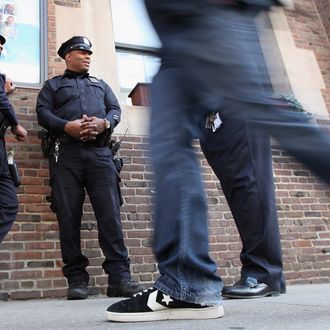
Despite the NYPD’s promise to keep an extra-close eye on the legality of their stop-and-frisk program, both Commissioner Ray Kelly and Mayor Bloomberg have continued to insist that it works. For one, they claim, there have been 5,600 “fewer murders in the past decade” thanks to stop-and-frisk, a number questioned in the New York Times today by Michael Powell, who writes, “The mayor’s math is certainly inventive, as well as deeply ahistoric.” But a survey of the city’s youth reveals one way the stops have definitely worked: ingraining a resigned sense of otherness in kids of color.
A report by WNYC today finds that one out of every five people stopped by police last year were between the ages of 14 and 18, and 86 percent of them were black or Latino, bringing the 2011 total to more than 120,000. White and Asian students, like those that make up most of Stuyvesant High School in Manhattan, know the cops aren’t looking for them: “They’re like hooded, in hoodies. They wear, like, very baggy clothing,” said an Asian-American freshman, describing who might look suspicious to cops. “And they’re African-American or Hispanic.” WNYC had trouble finding anyone at Stuyvesant who had been stopped.
On the other hand, at schools in Brownsville, some 14-year-olds said they’d been searched up to seven times, beginning as early as age 12. “When the cops come and stop you, just cooperate and do what they say,” one black teen explained, passing on the advice of his mom. “Because if you do something bad, or if you get too violent, they can take you to jail. They not the ones who’s going to get in trouble.” He’s also incredulous at the ignorance of his innocent-looking peers: “I think that’s discrimination because white kids in Manhattan have no idea cops can frisk you for no reason,” he told WNYC, “like they walk past the cops and actually say, ‘Good Morning’ to them.”
“Fear is corrosive as acid,” Powell writes in the Times today. Those effects become alarmingly clear from the mouths of kids.





























